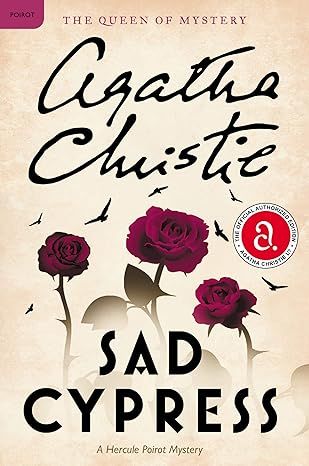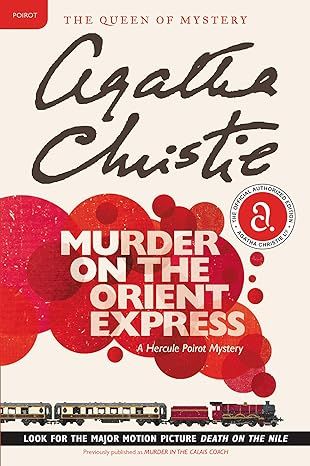Sad Cypress: A Hercule Poirot Mystery: The Official Authorized Edition (Hercule Poirot Mysteries, 20)Hardcover
4.5
-
3,014 ratings
Make room in your beach bag for this great summer read
In Agatha Christie’s classic murder mystery Sad Cypress, a woman damned by overwhelming evidence stands accused of murdering her romantic rival, and only Hercule Poirot stands between her and the gallows.
Beautiful young Elinor Carlisle stood serenely in the dock, accused of the murder of Mary Gerrard, her rival in love. The evidence was damning: only Elinor had the motive, the opportunity, and the means to administer the fatal poison.
Yet, inside the hostile courtroom, only one man still presumed Elinor was innocent until proven guilty. Hercule Poirot was all that stood between Elinor and the gallows.…
Kindle
$1.99
Available instantly
Audiobook
$0.00
with membership trial
Hardcover
$4.96
Paperback
$12.79
Ships from
Amazon.com
Payment
Secure transaction
ISBN-10
006207394X
ISBN-13
978-0062073945
Print length
304 pages
Language
English
Publisher
William Morrow Paperbacks
Publication date
August 29, 2011
Dimensions
0.68 x 5.31 x 8 inches
Item weight
2.31 pounds
Product details
ASIN :
B000FCK9CW
File size :
4324 KB
Text-to-speech :
Enabled
Screen reader :
Supported
Enhanced typesetting :
Enabled
X-Ray :
Enabled
Word wise :
Enabled
Editorial Reviews
“What Agatha Christie taught me was all about the delicate placement of the red herring. She was the ultimate genius behind ‘by indirections shall we find directions out.’” — Elizabeth George, New York Times bestselling author of the Inspector Lynley novels
“Poirot solves another exciting case.” — Daily Mail (London)
Sample
PART I
One
An anonymous letter!
Elinor Carlisle stood looking down at it as it lay open in her hand. She’d never had such a thing before. It gave one an unpleasant sensation. Ill-written, badly spelt, on cheap pink paper.
This is to Warn You (it ran),
I’m naming no Names but there’s Someone sucking up to your Aunt and if you’re not kareful you’ll get Cut Out of Everything. Girls Are very Artful and Old Ladies is Soft when Young Ones suck up to Them and Flatter them What I say is You’d best come down and see for Yourself whats Going On its not right you and the Young Gentleman should be Done Out of What’s yours—and She’s Very Artful and the Old Lady might Pop off at any time.
Well-Wisher
Elinor was still staring at this missive, her plucked brows drawn together in distaste, when the door opened. The maid announced, “Mr. Welman,” and Roddy came in.
Roddy! As always when she saw Roddy, Elinor was conscious of a slightly giddy feeling, a throb of sudden pleasure, a feeling that it was incumbent upon her to be very matter-of-fact and unemotional. Because it was so very obvious that Roddy, although he loved her, didn’t feel about her the way she felt about him. The first sight of him did something to her, twisted her heart round so that it almost hurt. Absurd that a man—an ordinary, yes, a perfectly ordinary young man—should be able to do that to one! That the mere look of him should set the world spinning, that his voice should make you want—just a little—to cry… Love surely should be a pleasurable emotion—not something that hurt you by its intensity….
One thing was clear: one must be very, very careful to be offhand and casual about it all. Men didn’t like devotion and adoration. Certainly Roddy didn’t.
She said lightly:
“Hallo, Roddy!”
Roddy said:
“Hallo, darling. You’re looking very tragic. Is it a bill?”
Elinor shook her head.
Roddy said:
“I thought it might be—midsummer, you know—when the fairies dance, and the accounts rendered come tripping along!”
Elinor said:
“It’s rather horrid. It’s an anonymous letter.”
Roddy’s brows went up. His keen fastidious face stiffened and changed. He said—a sharp, disgusted exclamation:
“No!”
Elinor said again:
“It’s rather horrid….”
She moved a step towards her desk.
“I’d better tear it up, I suppose.”
She could have done that—she almost did—for Roddy and anonymous letters were two things that ought not to come together. She might have thrown it away and thought no more about it. He would not have stopped her. His fastidiousness was far more strongly developed than his curiosity.
But on impulse Elinor decided differently. She said:
“Perhaps, though, you’d better read it first. Then we’ll burn it. It’s about Aunt Laura.”
Roddy’s eyebrows rose in surprise.
“Aunt Laura?”
He took the letter, read it, gave a frown of distaste, and handed it back.
“Yes,” he said. “Definitely to be burnt! How extraordinary people are!”
Elinor said:
“One of the servants, do you think?”
“I suppose so.” He hesitated. “I wonder who—who the person is—the one they mention?”
Elinor said thoughtfully:
“It must be Mary Gerrard, I think.”
Roddy frowned in an effort of remembrance.
“Mary Gerrard? Who’s she?”
“The daughter of the people at the lodge. You must remember her as a child? Aunt Laura was always fond of the girl, and took an interest in her. She paid for her schooling and for various extras—piano lessons and French and things.” Roddy said:
“Oh, yes, I remember her now: scrawny kid, all legs and arms, with a lot of messy fair hair.”
Elinor nodded.
“Yes, you probably haven’t seen her since those summer holidays when Mum and Dad were abroad. You’ve not been down at Hunterbury as often as I have, of course, and she’s been abroad au pair in Germany lately, but we used to rout her out and play with her when we were all kids.”
“What’s she like now?” asked Roddy.
Elinor said:
“She’s turned out very nice looking. Good manners and all that. As a result of her education, you’d never take her for old Gerrard’s daughter.”
“Gone all ladylike, has she?”
“Yes. I think, as a result of that, she doesn’t get on very well at the lodge. Mrs. Gerrard died some years ago, you know, and Mary and her father don’t get on. He jeers at her schooling and her ‘fine ways.’”
Roddy said irritably:
“People never dream what harm they may do by ‘educating’ someone! Often it’s cruelty, not kindness!”
Elinor said:
“I suppose she is up at the house a good deal… She reads aloud to Aunt Laura, I know, since she had her stroke.”
Roddy said:
“Why can’t the nurse read to her?”
Elinor said with a smile:
“Nurse O’Brien’s got a brogue you can cut with a knife! I don’t wonder Aunt Laura prefers Mary.”
Roddy walked rapidly and nervously up and down the room for a minute or two. Then he said:
“You know, Elinor, I believe we ought to go down.”
Elinor said with a slight recoil:
“Because of this—?”
“No, no—not at all. Oh, damn it all, one must be honest, yes! Foul as that communication is, there may be some truth behind it. I mean, the old girl is pretty ill—”
“Yes, Roddy.”
He looked at her with his charming smile—admitting the fallibility of human nature. He said:
“And the money does matter—to you and me, Elinor.”
She admitted it quickly.
“Oh, it does.”
He said seriously:
“It’s not that I’m mercenary. But, after all, Aunt Laura herself has said over and over again that you and I are her only family ties. You’re her own niece, her brother’s child, and I’m her husband’s nephew. She’s always given us to understand that at her death all she’s got would come to one or other—or more probably both—of us. And—and it’s a pretty large sum, Elinor.”
“Yes,” said Elinor thoughtfully. “It must be.”
“It’s no joke keeping up Hunterbury.” He paused. “Uncle Henry was what you’d call, I suppose, comfortably off when he met your Aunt Laura. But she was an heiress. She and your father were both left very wealthy. Pity your father speculated and lost most of his.”
Elinor sighed.
“Poor Father never had much business sense. He got very worried over things before he died.”
“Yes, your Aunt Laura had a much better head than he had. She married Uncle Henry and they bought Hunterbury, and she told me the other day that she’d been exceedingly lucky always in her investments. Practically nothing had slumped.” “Uncle Henry left all he had to her when he died, didn’t he?”
Roddy nodded.
“Yes, tragic his dying so soon. And she’s never married again. Faithful old bean. And she’s always been very good to us. She’s treated me as if I was her nephew by blood. If I’ve been in a hole she’s helped me out; luckily I haven’t done that too often!”
“She’s been awfully generous to me, too,” said Elinor gratefully.
Roddy nodded.
“Aunt Laura,” he said, “is a brick. But, you know, Elinor, perhaps without meaning to do so, you and I live pretty extravagantly, considering what our means really are!”
She said ruefully:
“I suppose we do… Everything costs so much��—clothes and one’s face—and just silly things like cinemas and cocktails—and even gramophone records!”
Roddy said:
“Darling, you are one of the lilies of the field, aren’t you? You toil not, neither do you spin!”
Elinor said:
“Do you think I ought to, Roddy?”
He shook his head.
“I like you as you are: delicate and aloof and ironical. I’d hate you to go all earnest. I’m only saying that if it weren’t for Aunt Laura you probably would be working at some grim job.”
He went on:
“The same with me. I’ve got a job, of sorts. Being with Lewis & Hume is not too arduous. It suits me. I preserve my self-respect by having a job; but—mark this—but I don’t worry about the future because of my expectations—from Aunt Laura.” Elinor said:
“We sound rather like human leeches!”
“Nonsense! We’ve been given to understand that some day we shall have money—that’s all. Naturally, that fact influences our conduct.”
Elinor said thoughtfully:
“Aunt Laura has never told us definitely just how she has left her money?”
Roddy said:
“That doesn’t matter! In all probability she’s divided it between us; but if that isn’t so—if she’s left all of it or most of it to you as her own flesh and blood—why, then, darling, I shall share in it, because I’m going to marry you—and if the old pet thinks the majority should go to me as the male representative of the Welmans, that’s still all right, because you’re marrying me.”
He grinned at her affectionately. He said:
“Lucky we happen to love each other. You do love me, don’t you, Elinor?”
“Yes.”
She said it coldly, almost primly.
“Yes!” Roddy mimicked her. “You’re adorable, Elinor. That little air of yours—aloof—untouchable—la Princesse Lointaine. It’s that quality of yours that made me love you, I believe.”
Elinor caught her breath. She said, “Is it?��”
“Yes.” He frowned. “Some women are so—oh, I don’t know—so damned possessive—so—so doglike and devoted—their emotions slopping all over the place! I’d hate that. With you I never know—I’m never sure—any minute you might turn round in that cool, detached way of yours and say you’d changed your mind—quite coolly, like that—without batting an eyelash! You’re a fascinating creature, Elinor. You’re like a work of art—so—so—finished!” He went on:
“You know, I think ours will be the perfect marriage… We both love each other enough and not too much. We’re good friends. We’ve got a lot of tastes in common. We know each other through and through. We’ve all the advantages of cousinship without the disadvantages of blood relationship. I shall never get tired of you, because you’re such an elusive creature. You may get tired of me, though. I’m such an ordinary sort of chap—”
Elinor shook her head. She said:
“I shan’t get tired of you, Roddy—never.”
“My sweet!”
He kissed her.
He said:
“Aunt Laura has a pretty shrewd idea of how it is with us, I think, although we haven’t been down since we finally fixed it up. It rather gives us an excuse, doesn’t it, for going down?”
“Yes. I was thinking the other day—”
Roddy finished the sentence for her:
“—That we hadn’t been down as often as we might. I thought that, too. When she first had her stroke we went down almost every other weekend. And now it must be almost two months since we were there.”
Elinor said:
“We’d have gone if she’d asked for us—at once.”
“Yes, of course. And we know that she likes Nurse O’Brien and is well looked after. All the same, perhaps we have been a bit slack. I’m talking now not from the money point of view—but the sheer human one.” Elinor nodded.
“I know.”
“So that filthy letter has done some good, after all! We’ll go down to protect our interests and because we’re fond of the old dear!”
He lit a match and set fire to the letter which he took from Elinor’s hand.
“Wonder who wrote it?” he said. “Not that it matters… Someone who was ‘on our side,’ as we used to say when we were kids. Perhaps they’ve done us a good turn, too. Jim Partington’s mother went out to the Riviera to live, had a handsome young Italian doctor to attend her, became quite crazy about him and left him every penny she had. Jim and his sisters tried to upset the will, but couldn’t.”
Elinor said:
“Aunt Laura likes the new doctor who’s taken over Dr. Ransome’s practice—but not to that extent! Anyway, that horrid letter mentioned a girl. It must be Mary.”
Roddy said:
“We’ll go down and see for ourselves….”
Read more
About the authors
Agatha Christie
Born in Torquay in 1890, Agatha Christie began writing during the First World War and wrote over 100 novels, plays and short story collections. She was still writing to great acclaim until her death, and her books have now sold over a billion copies in English and another billion in over 100 foreign languages. Yet Agatha Christie was always a very private person, and though Hercule Poirot and Miss Marple became household names, the Queen of Crime was a complete enigma to all but her closest friends.
Read more
Reviews
Customer reviews
4.5 out of 5
3,014 global ratings
Luci Castro
5
Great
Reviewed in the United States on January 28, 2022
Verified Purchase
All Agatha Christie’s book are masterpieces. The book came in time and in great conditions
Kindle Customer
5
Sad
Reviewed in the United States on October 12, 2021
Verified Purchase
It was a really interesting story with lots of the trademark twists and turns. Characters were well developed, and I never guess plot twist with Poirot!
2 people found this helpful
Kindle Cat
5
Winner
Reviewed in the United States on July 13, 2022
Verified Purchase
First time I can say I figured out who did it prior to the reveal!! Oh, what a great writer!! On to the next book.
6 people found this helpful
Kindle Customer
5
Fascinating Mystery
Reviewed in the United States on November 26, 2023
Verified Purchase
The book is a fascinating Hercule Poirot mystery that has a quote about sad cypress from Shakespeare ( because cypress was used to make coffins). The whole story with all the different characters and their different motivations is very interesting and sometimes melancholy. It is one of Agatha Christie 's best mysteries.
2 people found this helpful
Matthias Goertz
5
unusual structure, solution is a bit far fetched perhaps, but certainly surprising
Reviewed in the United States on April 26, 2021
Verified Purchase
Starts and ends with a court case, which makes for an unusual structure, and perhaps one misses Poirot's usual theatrical performance in the final revelation, but it works very well and demonstrates AC's versatility.
Solution is a bit far fetched, but it is surprising and hangs together nevertheless. Re-reading the book after a few years, I found that while I had a dim memory of the solution, I had actually forgotten most of it, for a while suspected the wrong culprit, and found the resolution almost as surprising as upon the first reading.
Read more
6 people found this helpful
Top Agatha Christie titles
View allBest Sellers
View all
The Tuscan Child
4.2
-
100,022
$8.39

The Thursday Murder Club: A Novel (A Thursday Murder Club Mystery)
4.3
-
155,575
$6.33

Sapiens: A Brief History of Humankind
4.6
-
140,302
$13.49

The Butterfly Garden (The Collector, 1)
4.3
-
88,556
$9.59

Things We Hide from the Light (Knockemout Series, 2)
4.4
-
94,890
$11.66

The Last Thing He Told Me: A Novel
4.3
-
154,085
$2.99

The Perfect Marriage: A Completely Gripping Psychological Suspense
4.3
-
143,196
$9.47

The Coworker
4.1
-
80,003
$13.48

First Lie Wins: A Novel (Random House Large Print)
4.3
-
54,062
$14.99

Mile High (Windy City Series Book 1)
4.4
-
59,745
$16.19

Layla
4.2
-
107,613
$8.99

The Locked Door
4.4
-
94,673
$8.53


